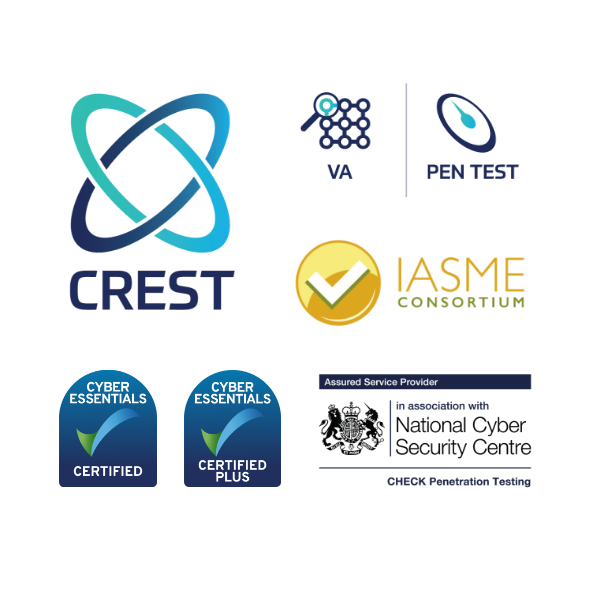Red Teaming Services | Cyber Security Services
Detect.
Red Teaming Services
Red Team engagements are an advanced type of Penetration Testing (also known as PEN Testing) within cyber security that simulates a real-world attack to access sensitive data or systems.
While the aim of most Penetration Tests is to identify vulnerabilities within your environment, Red Team engagements are goal-oriented and aim to demonstrate the realistic threats and risks against your technology, people, and physical environment.
Our expert PEN testing team will use additional techniques such as social engineering, enhanced reconnaissance, and threat intelligence to achieve their goal – putting your cyber security to the test.

Our Customers









What is Red Teaming?
Advanced Penetration Testing
Red Teaming is an advanced form of Penetration Testing that simulates real-world cyber attacks to test how well your organisation can detect and respond to threats.
Unlike traditional Pen Tests that focus on identifying vulnerabilities, Red Team engagements are goal-driven and assess the resilience of your people, processes, and technology using techniques like social engineering, threat intelligence, and deep reconnaissance.
What is Our Red Teaming Process?
Step-by-Step Breakdown of Our Red Teaming Approach
- Gather intelligence on the target organization, infrastructure, employees, and security posture.
- Use OSINT (Open-Source Intelligence), social engineering, and passive network scanning to identify potential attack vectors.
- Identify high-value targets (HVTs), key personnel, exposed services, and weak points.
- Develop tailored payloads, exploits, and attack vectors based on gathered intelligence.
- Set up Command and Control (C2) infrastructure for post-exploitation activities.
- Craft phishing emails, malicious documents, or pretexting scenarios for social engineering.
- Execute the attack by delivering payloads via phishing, USB drops, malicious web applications, or exploiting known vulnerabilities.
- Bypass security controls such as email filtering, endpoint protection, and network monitoring.
- Establish an initial foothold within the target environment.
- Escalate privileges from the initial compromised host (e.g., bypassing UAC, exploiting misconfigurations, or credential dumping).
- Move laterally within the network using pass-the-hash, Kerberoasting, or pivoting techniques.
- Identify and escalate to domain admin or high-value assets.
- Maintain access via backdoors, persistence techniques (scheduled tasks, WMI, registry modifications, etc.).
- Use custom C2 channels (HTTP, DNS tunneling, encrypted traffic) to avoid detection.
- Conduct stealthy operations to evade endpoint detection and response (EDR) solutions.
- Achieve mission goals – e.g., data exfiltration, unauthorized system access, or disrupting critical operations.
- Access sensitive files, financial data, customer records, or operational systems.
- Simulate real-world attacker motivations (financial gain, espionage, sabotage, etc.).
- Maintain stealthy access for long-term presence, mimicking advanced persistent threats (APT).
- Use covert exfiltration techniques (steganography, encrypted channels, cloud storage, or DNS tunneling).
- Securely exit without leaving forensic artifacts, covering tracks to challenge blue team detection.
- Provide a detailed report outlining findings, attack paths, detection gaps, and security recommendations.
- Conduct a purple team session, allowing defenders to learn from real-world attack scenarios.
- Deliver actionable insights to enhance incident response, threat detection, and security resilience.
Why Choose CyberLab?
Thousands of organisations across the UK trust us, here’s why…
CREST & CHECK Accredited
We are certified for both CREST and CHECK Green Light testing - an achievement not all testing companies can claim.
CREST Infrastructure & Application Testing
We are certified in both CREST Infrastructure and Application testing, ensuring comprehensive security coverage for all your systems.
Experienced & Senior Consultants
Our team consists of highly experienced, senior consultants and penetration testers with over 15 years of industry expertise.
Outstanding Communication
We establish dedicated teams or Slack channels to ensure seamless two-way communication between project managers, testers, and your team throughout the entire project.
Clear and Concise Reports
We provide easy-to-understand reports with detailed findings and actionable recommendations.
Specialised Testing Teams
We have specialised teams for Cloud, Application, and API testing. Our app and API testers, who are former developers, communicate fluently with your development team, leveraging their coding expertise to deliver deeper, more effective testing.
We Save You Time and Money
Clients consistently tell us that we deliver higher-quality testing in less time.
Forward-Thinking Security
Our pen testing team goes beyond identifying vulnerabilities, offering proactive solutions to mitigate future risks and ensure your security evolves ahead of emerging threats.

Protecting Local Government with Expert Penetration Testing
“We needed to find a way to meet very tight budget constraints. Of the suppliers we spoke to, only CyberLab demonstrated what we felt was a genuine desire to engage with us to reach a workable solution for both parties. I’d recommend CyberLab not just for their expertise in the whole cyber security area, but for their personalised and professional approach.”
– Mark Smith, Server Support Manager, Nottingham City Council
CREST, CHECK & Cyber Scheme Certified
All our penetration testers hold CREST accreditation, with senior consultants certified to advanced CREST levels. Our testers are also qualified as CHECK Team Leaders (CTLs) or Team Members (CTMs) under the Government-backed National Cyber Security Centre (NCSC) scheme.
Security testers who pass the Cyber Scheme exams demonstrate competence and skill recognised at the highest levels by the NCSC.
Our team has decades of combined experience and takes pride in operating at the highest level of the industry – conducting a broad range of government and commercial tests – and always aims to go the extra mile.

Types of Penetration Testing
Our team of experts have extensive experience in penetration testing a range of systems and applications.
These can be built into your testing plan at the scoping stage.
Red
Teaming
An advanced type of goal-oriented Pen Testing that simulates a real-world attack to access sensitive data or systems.
Vulnerability Assessments
Automated internal and external network and device vulnerability assessments for a high-level view of potential risks.
Internal Infrastructure Penetration Testing
Penetration Testing to identify and exploit vulnerabilities within your internal network. Executed by our CREST accredited penetration testers.
External Infrastructure Penetration Testing
Replicating a real-life attack to identify issues with network services, hosts, devices, web, mail, and FTP servers. Executed by our penetration testers.
IT Health
Check
CHECK approved IT Health Check (ITHC) is a Penetration Test audited by the National Cyber Security Centre (NCSC).
Website & Application Security Testing
Testing any application type, language, or environment, following the OWASP methodology for vulnerabilities and weaknesses.
Social Engineering
Often the easiest way to breach a company or network is not by hacking a website, it is by tricking employees to gain access to systems or a building.
Build Reviews
Performed by our expert consultants, Build Reviews assess the configuration of the operating system, device configuration and its settings against industry benchmarks.
Red Teaming vs Penetration Testing
Key Differences Between Red Teaming and Penetration Testing
| Red Teaming |
|---|
| Objective - Simulate a real-world, targeted attack to test an organisation’s detection and response capabilities. |
| Approach - Covert and goal-oriented, mimicking advanced persistent threats (APTs). |
| Scope - Broad: covers people, processes, and technology (e.g., phishing, physical intrusion, network attacks). |
| Attack Simulation - Focuses on stealth over depth; emulates real adversarial behaviour to avoid detection. |
| Defensive Awareness - Blue team is unaware (unless purple teaming); tests real-world detection and response. |
| Duration - Long-term (weeks to months). |
| Outcome - Post-engagement report showing how red team compromised assets and how the blue team responded. |
| Compliance - Not compliance-driven; focused on assessing real-world resilience. |
| Penetration Testing |
|---|
| Objective - Identify and exploit vulnerabilities in a defined scope to assess security weaknesses. |
| Approach - Typically overt; the organisation is aware of the test and it follows a structured, checklist-based approach. |
| Scope - Predefined and limited to specific assets (e.g., web apps, networks, APIs, cloud). |
| Attack Simulation - Focuses on depth over stealth; targets in-scope systems for vulnerabilities. |
| Defensive Awareness - Blue team is usually aware and may assist in testing and validation. |
| Duration - Short-term (days to weeks). |
| Outcome - Detailed report of vulnerabilities, exploitability, and remediation recommendations. |
| Compliance - Often driven by regulatory or compliance needs (e.g., PCI DSS, ISO 27001, CHECK). |
Red Teaming vs Penetration Testing
| Red Team |
|---|
| We test systems simultaniously |
| We work to fluid, adaptable targets |
| Longer testing schedule |
| We don't tell your people what we're doing |
| Our testers will be creative and use any means necessary |
| Pen Test |
|---|
| We test systems independently |
| We define our targets before we start |
| Short term tests |
| Your people know what we're testing and when |
| Our testers use a suite of commercially available testing tools |
Speak With an Expert
Enter your details and one of our specialists will be in touch.
Whether you’re looking to implement basic cyber security best practice, improve your existing defences, or introduce a new system or solution, our team of expert consultants, engineers, and ethical hackers are here to help.
Our team specialise in creating bespoke security solutions and testing packages to improve and maintain your security posture.
We are 100% vendor agnostic and will only ever recommend the best products and solutions for your requirements.



